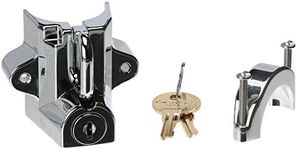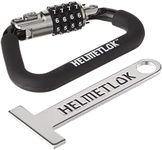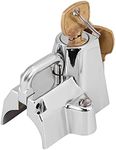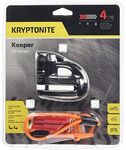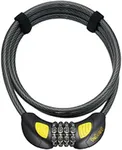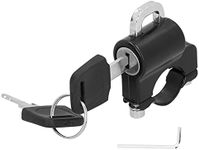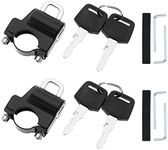Buying Guide for the Best Motorcycle Helmet Locks
Choosing the right motorcycle helmet lock is important for keeping your helmet safe when you leave your bike unattended. There are several types of locks available, each with its own strengths and weaknesses. The best lock for you will depend on how and where you park your motorcycle, how often you need to secure your helmet, and how much convenience or security you want. Understanding the key features of helmet locks will help you make a smart choice that fits your lifestyle and gives you peace of mind.Lock TypeLock type refers to the mechanism and design used to secure your helmet. Common types include cable locks, D-ring locks, carabiner-style locks, and built-in helmet locks. Cable locks are flexible and can secure more than one helmet or other gear, but may be bulkier to carry. D-ring and carabiner locks are compact and easy to use, but may only fit certain helmet styles. Built-in locks are attached to the motorcycle itself, offering convenience but sometimes less flexibility. To choose the right type, think about how you want to carry and use the lock, and whether you need to secure just your helmet or other items as well.
Material and Build QualityMaterial and build quality determine how resistant the lock is to cutting, tampering, or weather damage. Most locks are made from steel, aluminum, or a combination, sometimes with a protective coating to prevent scratches. Thicker cables or solid metal parts generally offer more security but can be heavier. If you often park in public or high-risk areas, prioritize a lock with strong, durable materials. For occasional use in safer areas, a lighter lock may be sufficient.
Locking MechanismThe locking mechanism is how the lock opens and closes, such as key locks, combination locks, or even electronic locks. Key locks are straightforward but require you to keep track of a key. Combination locks are convenient since you don’t need a key, but you must remember the code. Electronic locks offer advanced features but may need batteries. Choose a mechanism that matches your preference for convenience and your ability to keep track of keys or codes.
PortabilityPortability refers to how easy it is to carry the lock with you. Some locks are small and lightweight, fitting in a pocket or under your seat, while others are bulkier and may need to be stored in a bag. If you want a lock you can always have on hand, look for compact and lightweight options. If you don’t mind carrying extra gear, a larger lock may offer more security.
Helmet CompatibilityHelmet compatibility means whether the lock works with your specific helmet type and its fastening system. Some locks are designed for helmets with D-rings, while others can secure helmets with quick-release buckles or other designs. Make sure the lock you choose fits your helmet’s closure system and can attach securely to your motorcycle or another fixed object.
Weather ResistanceWeather resistance is about how well the lock stands up to rain, sun, and other outdoor conditions. Locks with rust-resistant coatings or weatherproof covers last longer and keep working smoothly. If you often park outside, especially in wet or humid climates, look for a lock that specifically mentions weather resistance to avoid problems with rust or sticking mechanisms.



